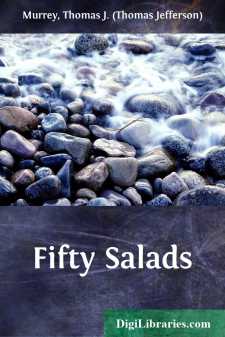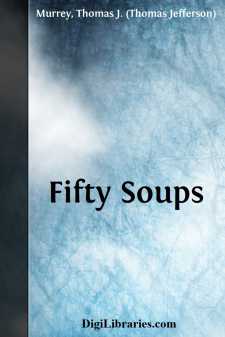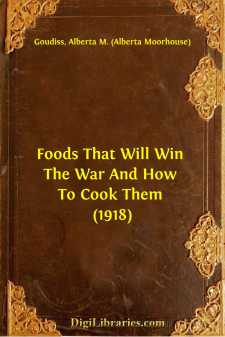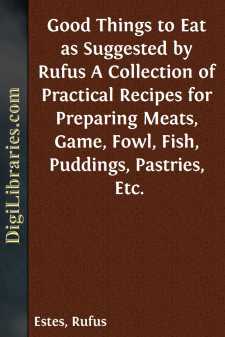Cooking
- General
- History 1
- Reference 10
- Regional & Ethnic 3
- Vegetarian 10
General Books
Sort by:
MEATS AND POULTRY. To Boil Fresh Meat. In boiling fresh meat, care is necessary to have the water boiling all the time it is in the pot; if the pot is not well scummed, the appearance of the meat will be spoiled. Mutton and beef are preferred, by some, a little rare; but pork and veal should always be well done. A round of beef that is stuffed, will take more than three hours to boil, and if not...
more...
by:
Elizabeth Moxon
ENGLISH HOUSEWIFRY. 1. To make VERMICELLY SOOP. Take a neck of beef, or any other piece; cut off some slices, and fry them with butter 'till they are very brown; wash your pan out every time with a little of the gravy; you may broil a few slices of the beef upon a grid-iron: put all together into a pot, with a large onion, a little salt, and a little whole pepper; let it stew 'till the meat...
more...
by:
Carrie V. Shuman
TEA Tastes differ as to which of the many kinds of tea is the best, and yet the general use of English Breakfast and Oolong warrants the recommending of these two teas as standard. The Chinese have taught us the correct idea of tea drinking; to have it always freshly made, with the water boiling, and to steep the leaves at table. The tea table can be easily equipped now with a boiler in silver or...
more...
REMARKS ON SALADS. Of the many varieties of food daily consumed, none are more important than a salad, rightly compounded. And there is nothing more exasperating than an inferior one. The salad is the Prince of the Menu, and although a dinner be perfect in every other detail except the salad, the affair will be voted a failure if that be poor. It is therefore necessary for those contemplating...
more...
REMARKS ON SOUPS. Soups, like salads, present an excellent opportunity for the cook to display good taste and judgment. The great difficulty lies in selecting the most appropriate soup for each particular occasion; it would be well to first select your bill of fare, after which decide upon the soup. The season, and force of circumstances, may compel you to decide upon a heavy fish, such as salmon,...
more...
HINTS FOR MEALTIME How often do we hear women exclaim, "Oh dear, what shall I have for the next meal?" This little book will aid you in answering that troublesome question. The recipes are carefully selected and we hope you will find them helpful. More important to you than the question of food is that of health. Therefore, in this book we show you many letters from women who have received great...
more...
SAVE WHEAT Reasons Why Our Government Asks Us to Save Wheat, with Practical Recipes for the Use of Other Grains A slice of bread seems an unimportant thing. Yet one good-sized slice of bread weighs an ounce. It contains almost three-fourths of an ounce of flour. If every one of the country's 20,000,000 homes wastes on the average only one such slice of bread a day, the country is throwing away...
more...
by:
Alice Bradley
INTRODUCTION Meals of many courses are neither practical nor popular with the modern hostess. For a company luncheon or supper it is not necessary to serve more than a hot dish, a salad, a biscuit or sandwich, a dessert and a beverage. A first course and a relish may be provided if desired. SUNDAY NIGHT SUPPERS The following menus were arranged especially as Sunday night suppers, but they are equally...
more...
by:
Rufus Estes
SKETCH OF MY LIFE I was born in Murray County, Tennessee, in 1857, a slave. I was given the name of my master, D. J. Estes, who owned my mother's family, consisting of seven boys and two girls, I being the youngest of the family. After the war broke out all the male slaves in the neighborhood for miles around ran off and joined the "Yankees." This left us little folks to bear the burdens....
more...
by:
Harry Snyder
CHAPTER I GENERAL COMPOSITION OF FOODS 1. Water.—All foods contain water. Vegetables in their natural condition contain large amounts, often 95 per cent, while in meats there is from 40 to 60 per cent or more. Prepared cereal products, as flour, corn meal, and oatmeal, which are apparently dry, have from 7 to 14 per cent. In general the amount of water in a food varies with the mechanical structure...
more...











